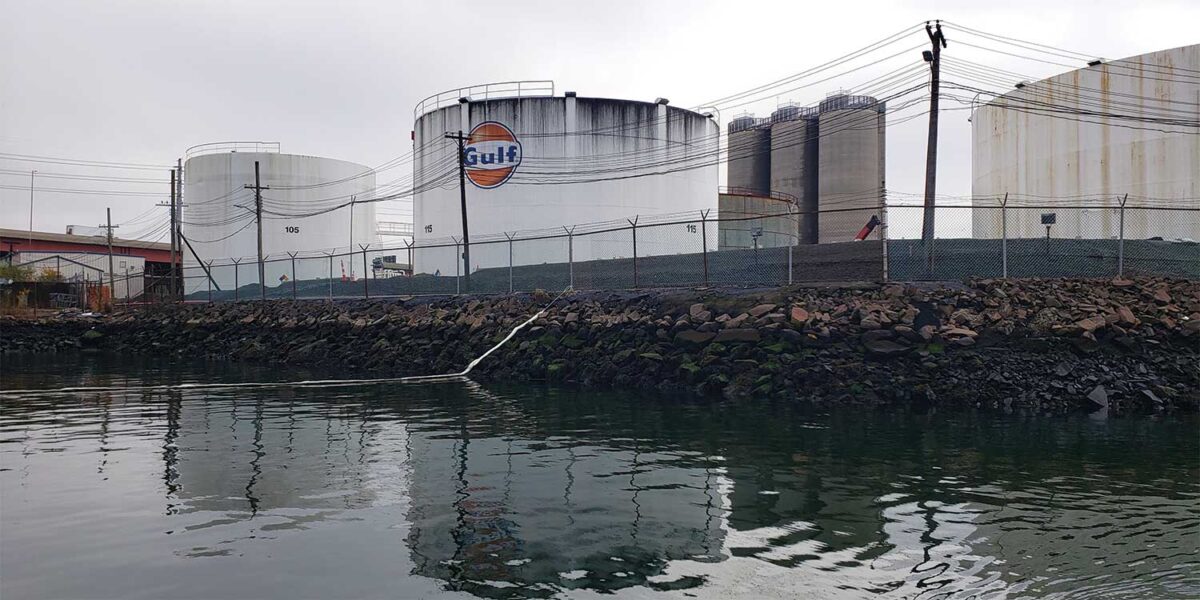For years, Shell Oil has jeopardized the health and safety of New England’s coastal residents with storage tanks adjacent to waterways and communities. CLF is suing the oil giant – and making progress.
Xóchitl García has spent her entire life in the Fair Haven neighborhood of New Haven, Connecticut. It’s an area of modest, mostly multi-family clapboard homes just a couple of miles – a seven-minute drive – from the massive Shell Oil storage tanks hulking over the New Haven Harbor.
She’s worried about the facility’s overpowering smells and its possible effects on health, water quality, and the safety of people who fish along the banks of the nearby Mill River. Another of her looming concerns: the possibility that the next big storm will flood the aging tanks. A leak from just one of them would inundate the neighborhood with gasoline, ethanol, fuel oil, and diesel.
“It’s a big flood zone for sure,” says García. “One of the things that’s most concerning is all these affected areas have churches, schools, grocery stores, bodegas, housing, spaces that most of the community uses or needs.”
García’s concerns are echoed repeatedly across the community and are one reason CLF sued Shell Oil and nearby Gulf Oil in 2021 for violating federal pollution regulations in New Haven. The suits unfold within a troubling context: Big Oil has known about climate change for decades while actively perpetuating it. And, even as these companies publicly denied the worsening crisis for years, they spent millions actively undermining climate science and government attempts to tackle the growing threat. As the weather grows more extreme, they have become even more duplicitous.
Meanwhile, oil infrastructure – like that in New Haven – sits on the edge of waterways and dense communities, where it is vulnerable to the increasingly powerful storms and sea level rise caused by climate change. This is the case for Shell’s New Haven facility and its oil terminal in Providence, Rhode Island. The Providence facility, which CLF sued in 2017, threatens the health and safety of people and wildlife along Narragansett Bay. The cases in New Haven and Providence followed on the heels of CLF’s 2016 lawsuit against ExxonMobil over conditions at its Everett, Massachusetts, oil terminal.
“We consider Shell’s climate neglect to be an imminent threat,” says Bradley Campbell, president of CLF. “The company’s inconsistent positions about climate risk and unlawful operation of its New Haven facility are putting families, businesses, and local waters in harm’s way.“

First of Its Kind
CLF lawsuits against these oil giants are groundbreaking. We were among the first to sue Big Oil to remedy the risks from facilities adjacent to critical waterways and coastlines prone to flooding in extreme weather. And, despite Shell’s attempts to get our cases thrown out of court, both the New Haven and Providence lawsuits have been given the go-ahead by separate judges.
That makes them the first cases of their kind to reach this stage of the legal process. We are now in the legal discovery stage, a critical step to moving a case to trial. Shell has tried to stall our efforts to request relevant documents, but the company was forced to relent under court order. So far, CLF advocates have deposed numerous Shell employees and consultants and received tens of thousands of documents describing Shell’s acknowledgment of severe weather threats and its failure to protect its at-risk facilities from them.
Lies and Deceit in New Haven and Providence
As the case against Shell in New Haven moves forward, CLF continues parallel work in Rhode Island. We recently filed a motion to force Shell to answer basic questions about its Providence terminal, which it has failed to safeguard against flooding. Unsurprisingly, Shell has been evasive, refusing to answer questions that might implicate high-level Shell parent companies and officials. Still, the evidence turned over by the company itself starkly demonstrates our point: Company photos show Shell’s Providence facility flooded with water after a December 2022 storm. It’s clear the company knows its terminals are vulnerable to weather conditions worsened by climate change.
“Other oil facilities around the country have been breached and discharged during big storms like Hurricane Sandy and Hurricane Harvey,” says Darrèll Brown, vice president of CLF’s Rhode Island office. “Recent storms that have threatened New England have been severe, and a catastrophic hit is just a matter of time unless Shell takes action to protect the community and environment.”
Meanwhile, in New Haven, worried residents remain resolute. Ana Juarez, a mental health advocate and resident of Fair Haven, worries about the long-term mental health consequences of seeing “the eyesore” of oil tanks from her treeless neighborhood. Long-time resident Anstress Farwell, a declarant in the case against Shell, worries about the age and condition of tanks, some of which she says are open to neighborhood backyards. After storms, she says, she has observed oil slicks on puddles in the street. But, Farwell adds, she worries less knowing a regional watchdog is on the case.
“It’s the work that CLF has already done in Massachusetts and Rhode Island that teed it up to come into Connecticut with such expertise and experience,” she reflects. “We’re just so grateful for that. We are so excited that this serious, ongoing problem is getting attention with the level of resources and expertise that CLF has.”
